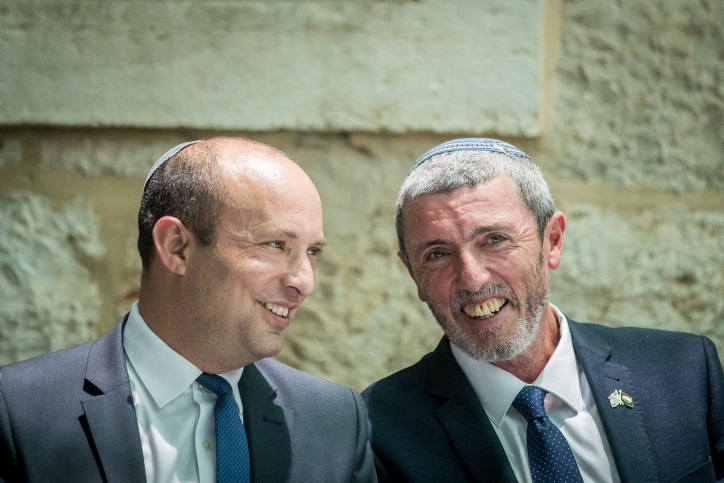Netanyahu has joined forces with religious radicals who have stopped talking about Palestinians and are instead pushing a homophobic and sexist agenda. It may just might seal his political doom.
By Meron Rapoport

It didn’t take long for Prime Minister Netanyahu to use the doomsday weapon against Avigdor Liberman immediately following the last elections. Netanyahu blamed his former ally for torpedoing the establishment of a right-wing government, announcing to a group of journalists that “Liberman is part of the left” as part of a last-ditch effort to delegitimize the Yisrael Beitenu leader.
The accusation was so strange — considering what the public knows about Liberman — that Ayala Hasson, one of Israel’s most seasoned journalists, burst out laughing. Members of Netanyahu’s Likud party believed that associating Liberman with the left was enough to ensure he doesn’t pass the election threshold next time around.
But polls show that precisely the opposite is happening, and the main reason is Liberman’s so-called war against “religious coercion.” It began with his insistence that the Knesset pass a law to ensure ultra-Orthodox Jews are no longer exempted from military service, prompting the prime minister to move the elections to an earlier date. But throughout his election campaign, Liberman broadened the scope of his war, ruthlessly attacking the ultra-Orthodox and the “messianic” religious right and promising that he would not sit alongside them in the government. Separation of religion and state, in turn, has become one of the hot-button issues of the current election cycle.
On the one hand, Bezalel Smotrich, who hails from the far-right of the national-religious movement, insists on talking about installing a halakhic Jewish state in Israel, while the Sephardic Shas party continues to stand firm behind its support for gender segregation at public events. On the other hand, both Benny Gantz’s centrist Blue and White party and the Democratic Union — a political alliance between Meretz, Ehud Barak, and Labor defector Stav Shaffir — have been warning against these theocratic trends. Only the Joint List and Labor have refrained from speaking openly about the issue.
If what the polls say are true, and Liberman will make good on his promise not to sit with the ultra-Orthodox and the religious radicals, the issue of separation of religion and state could potentially bring an end to the Netanyahu era.
A deal gone wrong
But why is separation of religion and state such a central issue in these elections? It likely all began with Liberman’s electoral considerations, once he realized that Netanyahu’s relationship with the ultra-Orthodox parties was the prime minister’s Achilles heel. It is no coincidence, then, that Liberman insisted on passing an ultra-Orthodox conscription law as a condition for joining the coalition following the last elections. The law itself has no practical significance, but it does represent the unwritten “deal” between Netanyahu and the Haredi public in Israel, which hass allowed the latter to prevent the ultra-Orthodox from leaving their closed communities, while ensuring that the Haredi public remains firmly on the political right.
This “deal” has led to an increase in the relative political power of the ultra-Orthodox over the past few years. After winning 15 seats in the previous elections, the two Haredi parties, Shas and United Torah Judaism, represented nearly a quarter of the 65 seats won by the right-wing bloc, as opposed to a fifth of the same bloc in the 2015 elections. That the ultra-Orthodox’s power is growing surely worries Liberman’s electorate, which is firmly secular.

But it seems there is something deeper at play. One of the strategic goals of Netanyahu and the Israeli right over the past decade has been to convince Israelis that there is no Palestinian partner for peace and that the status quo is the desirable situation. The erasure of the Green Line and Israel’s policies of creeping annexation in the West Bank have both been integral to this strategy. The dramatic decrease in Palestinian violence against Israelis has certainly helped foster a sense of calmness as a result of that very status quo.
It worked. Not only did the word “occupation” disappear from the political lexicon, even discussions of a “political solution,” which had been at the center of election campaigns for the past 40 years, have almost entirely evaporated. The election of Donald Trump, his one-sided support for Israel, and the Palestinian decision to sever ties with the exclusive arbiters of the peace process for the last two-and-a-half decades have convinced Jewish Israeli voters that there is no solution in sight and therefore no reason to invest in peace talks.
But it is very likely that Netanyahu’s success in getting rid of negotiations with Palestinians is now threatening his very rule. As long as there was a sense that “Israel was in danger” or that “they are going to sell the country to the Arabs” — as was the case when Netanyahu was elected in 2009 shortly after the Gaza disengagement — the Israeli right stood together. Now that the “danger” has passed, the cracks are beginning to show. Issues like religious coercion, which touch on the day-to-day life of Israeli voters, expose these cracks more than any other issue.
Benny Gantz’s political opinions might be very far from those of Joint List Chairman Ayman Odeh, but the distance between their lifestyles is not. There isn’t a huge gap between the way Liberman and the ultra-Orthodox view the Palestinian issue, but when it comes to religion and state, the will never see eye to eye. This gap even applies to Naftali Bennett and Smotrich, both members of the national-religious Yamina party.
The disappearance of the “threat of peace” can also explain the rhetoric we have been hearing from the national-religious community, particularly its ultra-Orthodox wing. Whether religious Zionists feel emboldened after having defeated the possibility of a Palestinian state — and see the current moment as the right time to move to the next stage and begin instilling “Jewish values” — or whether they are frustrated at the persistence of secularism among Israelis, it is clear that the discourse of “values” is of much greater importance than talking about peace.
This is most evident when it comes to “family values,” and particularly the rights of the LGBTQ community in Israel — perhaps the most burning issue among the national-religious. We saw it when Rafi Peretz said he supported conversion therapy or when Smotrich argued that the LGBTQ community should accept that there is a “right and healthy reality.” We saw it when the head of the Eli settlement’s pre-army academy made sexist comments and in the blatantly homophobic election campaign of the Noam party.
The rise of annexation, which would allow the right to see through its vision of a Greater Israel, is the direct result of the feeling among the religious right that the Palestinian issue has been solved. It is difficult to explain Smotrich’s support for a theocratic state without understanding that he and many others believe that we have never been closer to the establishment of a Greater Israel from the river to the sea.
A different way forward
Either way, the infighting is breaking apart the cohesiveness of the right. Liberman’s avowal to prevent the return of a coalition similar to the previous one is only one sign of that cleavage. But it has other aspects as well. The disagreements inside the religious Zionist community between “liberals” such as Bennett on the one hand and Smotrich and Peretz on the other, are threatening the stability of the national-religious camp itself. The growing anti-Haredi agenda among Likud-supporting mayors across the country is another expression of that instability.
Netanyahu is well aware of the consequences and is doing his best not to move too close to the ultra-Orthodox and the religious radicals. Appointing Amir Ohana, who previously headed Likud’s pride group, as justice minister is part of Bibi’s defense. But the prime minister has little room to maneuver; Israel’s centrist voters abandoned him long ago, which means that without the national-religious and the ultra-Orthodox, he has no chance of survival.
In the meantime, homophobia and sexism on the religious right and among the ultra-Orthodox have been fodder for the election campaigns of the opposition, from Liberman to Blue and White to the Democratic Union. The result could see Netanyahu lose his job, and may potentially leave the Haredi parties and the national-religious out of the next coalition.
This doesn’t mean that Israeli politics are moving to the left, at least when it comes to the occupation. But it could mean, at least in the short-term, that it may be possible to understand Israel’s right-left divide differently from now on. More than that, it could pave a path toward new political alliances and coalitions, different from the ones that have controlled Israeli politics over the past decades.
Meron Rapoport is an editor at Local Call, where this article first appeared in Hebrew. Read it here.

